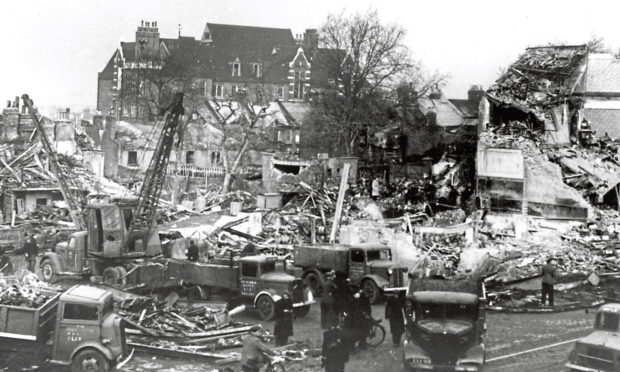In his new novel Light Perpetual, the brilliant author Francis Spufford carries out a “what if” experiment.
The story begins inside the haberdashery section of a London branch of Woolworths on a Saturday afternoon in 1944. There has been a rush of customers because the shop has taken delivery of saucepans, a rare luxury in straitened wartime. Eager mothers browse – “no one has seen a new pan for years” – as their children, too young to be left at home, fidget, gawp vacantly and pick their noses. Into this scene of pathos falls a Nazi bomb. Everyone dies in an instant.
At that awful point, based on a real incident in which a V2 rocket destroyed a store in New Cross, killing 168 people, Spufford rewinds. With empathy and some humour, he imagines the full lives of five of the children had the bomb never arrived – the highs and lows, moments of joy and tragedy, success and failure.
We love our uchronia. There are countless books, websites, movies, dramas and video games devoted to alternative histories in which Hitler won the war, in which JFK wasn’t assassinated or Jesus crucified, in which Margaret Thatcher never came to power or in which Hillary Clinton did. Livy’s History of Rome, written between 27 and 9 BC, imagines Alexander the Great living long enough to attack Europe.
It’s not only fictional what-ifs that obsess us. One of the strengths of democratic societies is the inclination to self-interrogate, to examine decisions and choices that didn’t work as planned, and to wonder what might have happened had we acted differently.
Much of Tony Blair’s post-Downing Street life has been spent defending and justifying his decision to go to war. Blair’s critics have never tired of attacking him for his choice. Britain would have been wiser staying out, they insist. We must do better next time.
We are now beginning this process in relation to Covid. As millions receive the vaccine and a return to normal life becomes distantly feasible, steely eyes are turning towards the decision-makers who have guided us through the past torrid year, depriving us of work, family, commerce, education and liberty. Delays, recklessness, over-caution, government contracts, motives and consequences will all be put under the microscope. There is the very real threat of extremely long and painstaking judge-led inquiries in which some very dull people will briefly become household names.
‘Unavoidable exercise in what-iffery’
This is all necessary, of course. Accountability and transparency form the bedrock of modern democracy, even if politicians would sometimes rather they didn’t. Boris Johnson will be weighed and judged. Nicola Sturgeon will be deliberated upon. Donald Trump will be condemned.
My concern is the manner in which we go about this essential function, this unavoidable exercise in what-iffery. In an age of rage, we prefer to scald and hurt rather than understand and learn.
One view of politics is, as Groucho Marks put it, “the art of looking for trouble, finding it everywhere, diagnosing it incorrectly and applying the wrong remedies”. I have a healthy and well-founded scepticism about politicians – 25 years among them will do that to a man. But I try to avoid cynicism, and for the past 12 months I have tried especially hard. As difficult as life has got, as invasive as the state has become, one thought has stubbornly reoccurred: “I’m glad it isn’t me making the decisions.”
Someone has to, though. Someone has to step up, take the weight on their shoulders, and say Yes or No. We might question the monstrous ego of the Prime Minister, or wave our fists at the First Minister for her unflinching pursuit of independence when there is so much else to be getting on with. But it ill-serves us to dismiss every action they take in every circumstance as low, dishonest and a means only to self-preservation.
Yet that is increasingly what we do. Much political discourse today is conducted in the feverish hives of social media. Extremes dominate, no quarter is given, and pre-worn prejudices are aggressively applied in all situations. On Covid, many have already donned the black cap and passed bilious sentence on our leaders long before any official, considered verdict can be rendered.
By all means, investigate the errors (and the successes) of this destructive crisis with rigour. Dig out corruption and bad practice. Let’s learn from the what ifs. But our society is better served if we do so with empathy, some humility, and an understanding that human frailty lies at the heart of the governing process. Leave the hate and the abuse out of it. After all, what if it had been you?











